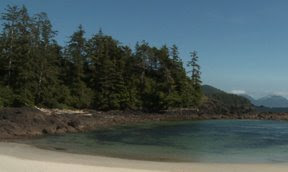 Back in January I wrote an article entitled “LAND GRABS AFFECT US ALL”, about the privatization of BC crown forestland. Last week the Auditor General of BC released his report, slamming the Ministry of Forests’ handling of publicly owned land, which was given to Western Forest Products (WFP) for private development.
Back in January I wrote an article entitled “LAND GRABS AFFECT US ALL”, about the privatization of BC crown forestland. Last week the Auditor General of BC released his report, slamming the Ministry of Forests’ handling of publicly owned land, which was given to Western Forest Products (WFP) for private development.Here is a quote directly from the report by John Doyle, Auditor General: “Overall, the report concludes that the removal of private land from TFLs 6, 19 and 25 was approved without sufficient regard for the public interest. The report notes that: the decision was not adequately informed — it was based upon incomplete information that focused primarily on forest and range matters and the interests of the licensee, with too little consideration given to the potential impacts on other key stakeholders; consultation was not effective and communication with key stakeholders and the public about the decision was not transparent; and the impacts of previous land removal decisions were not monitored to help inform future decisions.”
Much media attention has been given to the land around Jordan River, just west of Sooke, where 28,273 hectares of land was taken out of the publicly owned tree farm by the Ministry of Forests and given to WFP without any financial compensation. However that only accounts for lands privatized within TFL25 while lands privatized in the other TFLs have gone mostly unnoticed. TFL19 is much larger and is located around Gold River, Tahsis, and Zeballas while TFL6 lands are located around Port McNeil, Port Alice, Coal Harbour, and Winter Harbour. The market value of ocean side property in these areas will equal massive profits for WFP and will alter the landscape forever.
The intention of the Tree Farm License system was to legally bind the timber to the land so that logging companies would be obliged to provide work in those areas for generations to come. The spiraling downturn in the forestry industry is as a direct result of these obligations being altered by the current BC government. Raw log exports, mill closures, and privatization of land are allowing logging companies to profit without putting back into local communities for the future.
At the heart of this controversy is the fact that Minister Rich Colman’s older brother, Stan Coleman, works for Western Forest Products where he is their Manager of Strategic Planning. Public outcry has been growing since this story first surfaced. As a result, Premier Campbell shuffled Rich Coleman from his cabinet position as the Minister of Forests, Range, and Housing to the Ministry of Housing and Social Development on June 23, 2008.
Pat Bell was appointed as the new Minister of Forests and Range from his last posting as Minister of Agriculture and Lands and Minister of State for Mining. A government website states; “Prior to becoming an MLA, Mr. Bell owned a trucking company and co-owned a logging company.” Bell has been defending the actions of his predecessor since his appointment.
None of this scandal should come as a surprise to the voting public, after all the BC Liberal party came to power in 2001 with millions of dollars in financial contributions from the largest logging companies in BC. These companies are mostly owned by multinational investor groups. Waterfront property is already at a premium on the international real estate market and the Winter Olympics will shine a light on BC real estate. Placing publicly owned land in the hands of private investors will mean the average BC citizens will be left out of the deal.
According to the government’s website Gordon Campbell was a developer before becoming the mayor of Vancouver. The same site states: “Before his election to the Legislative Assembly, Mr. Coleman ran a real estate management and consulting company.” The privatization of public resources in BC has become the hallmark of the Gordon Campbell Liberal government: BC Rail, BC Ferries, BC Hydro, BC Forest lands, and now they are working on BC water.
What is needed now is a judicial review to follow the auditor general's report. This would mean that the BC Supreme Court would investigate allegations of any wrong doings and the consequences could merit legal actions. Otherwise the Campbell government will continue to shuffle cabinet and flood the media with spin in the hope of sliding yet another issue under the carpet so that they will be elected again Tuesday May 12, 2009.